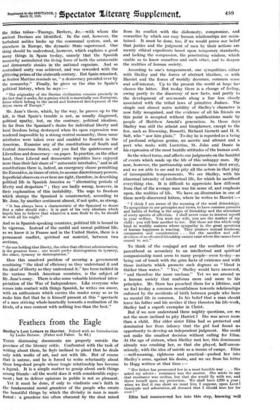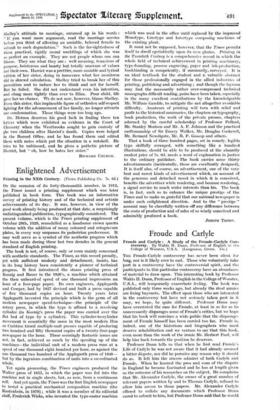Feathers from the Eagle
Shelley's Lost Letters to Harriet. Edited with an Introduction by Leslie Hotson. (Faber and Faber. 7s. ed.)
MESE distressing documents are properly outside the province of the literary critic. Confronted with the. task of writing about them, he feels inclined to plead that he deals only with works of art, and not with life. But of course that is untrue, and he is forced to write reluctantly about these long-dead people whose tragic relationship has become a legend. It is a simple matter to gossip about such things among friends—all the world does it with considerable enjoy- ment ; but to deliver opinions in public is not so pleasant.
Yet it must be done, if only to vindicate one's faith in the fundamental moral grandeur of the people who create the beautiful things by which the divinity in man is mani- fested : a grandeur too often obscured by the dust raised
from its conflict with the dishonesty, compromise, and cowardice by which our easy human relationships are main- tained. It must be done, too, if we would prove our belief that justice and the judgment of men by their actions are merely ethical expedients based upon temporary standards, and lacking the compassion, the penetrating wisdom, which enable us to know ourselves and each other, and to deepen the realities of human society.
According to one's temperament, one sympathizes either with Shelley and the forces of abstract idealism, or with Harriet and the forces of worldly decorum, common sense and self-interest. Up to the present the world at large has chosen the latter. But to-day there is a change of feeling, owing partly to the discovery of new facts, and partly to the development of sex-morals along a line less closely associated with the tribal laws of primitive Judaea. The simple and almost naive nobility of Shelley's character is now fully recognized, and the evidence of all his friends on this point is accepted without the qualifications made by people of Matthew Amold's generation. In those days Shelley was still the atheist and blasphemer, except to the few, such as Browning, Rossetti, Richard Garnett and H. S. Salt, who " saw him plain." To-day he is regarded as a 'being of profound religious genius, an ascetic and altruist and a poet who ranks with Lucretius, St. John and Dante in his expression of the most beatific attitudes of the human soul.
So the wheel turns, and affects our judgments on the handful of events which made up the life of this unhappy man. By now, however, the partisanship and rancour have died away, and we are able to see and to pity all the actors in that play of incompatible temperaments. We see Shelley, with his abnormal intensity of intellectual life, for which he sacrificed everything else. It is difficult to appreciate how different from that of the average man was his sense of, and emphasis upon, the realities of life. We have an illustration in one of these newly-discovered letters, where he writes to Harriet
- " I think I am aware of the meaning of the word (friendship). To sympathize in our principles and views, to have common pursuits and habits of feeling is, the origin of friendship and the, attendant of every species of affection. I shall never cease to interest myself in your welfare. You were my wife, you are the mother of my child : you will bear another to me. But these are ties which 'only bind to worldly matters where sympathy in the, great question, of human happiness is wanting. They produce mutual kindness, compassion' and consideration . . . but the sacrifice and self. devotion of an elevated friendship cannot exist where the causes have ceased to act."
To think of the conjugal act and the resultant ties of parenthood as secondary to an intellectual and spiritual companionship must seem to many people—even to-day—as being out of touch with the grim facts of existence and with those instincts which promote such dogmas as blood is thicker than water." " Yes," Shelley would have answered, " and therefore the more unclean." Yet we see around us a human society that conforms more and more to his principles. Mr. Shaw has preached them for a lifetime, and we feel to-day a common resentfulness towards relationships enforced by the accidents of birth between people who have no mental life in common. In his belief that a man should leave his father and his mother if they threaten his life-work, Shelley had a superb exemplar in Christ.
But if -we now understand these mighty questions, are we not the more inclined to pity Harriet ? She was never more than a child. Her elder sister Eliza had so protected and dominated her from infancy that the girl had found no opportunity to develop an independent judgment. She could not make the smallest decision without calling for Eliza.
At the age of sixteen, when Shelley met her, this dominance already was crushing her, so that she played, half-uncon- sciously, with the idea of suicide as a means of escape. Eliza —well-meaning, righteous and practical—pushed her into Shelley's arms, against his desire, and we see from his letter to Hogg written at that time :— " Her father has persecuted her in a most horrible way . . . She asked, my advice : resistance was the answer. She wrote to say that resistance was useless, but that she would fly with me, and threw herself upon my protection. We shall have £200 a year : when we find it run short we must live, I suppose, upon Love Gratitude and admiration, all demand that I should love her for ever I "
Eliza had manoeuvred her into this step, knowing well Shelley's attitude to marriage, summed Arp in his words : "If you want more argument, read the marriage service before you think of allowing an amiable, beloved female to submit to such degradation." Such is the far-sightedness of those practical, rigidly moral werldlin0X of which she was so perfect an example. They are not people whom one can blame. They are what they are : well meaning, tenacious of purpose, boisterous and hearty but totally unaware of values not their own. Harriet was a prettier, more amiable and lyrical edition of her sister, doing in innocence what her monitress did in shrewd calculation. Shelley tried to break her of this parasitism and to induce her to think and act for herself. But he failed. She did not understand even his intention, and clung more tightly than ever to Eliza. Poor child, life gave her no chance. We do not now, however, blame Shelley. Even this sister, this-implacable figure of orthodox self-respect fighting for the advancement of her family, no longer attracts our condemnation. Those things were too long ago.
Dr. Hotson deserves his good luck in finding these ten letters which were exhibited as evidence in the Court of Chancery when the Westbrooks sought to gain custody of the two children after Harriet's death. Copies were lodged in the Record Office, and he has found them and edited them with notes which put the situation in a nutshell. He tries to be unbiassed, and he gives a pathetic picture of Harriet, but " oh, how he hates her sister."
RICHARD CHURCH.



















































 Previous page
Previous page